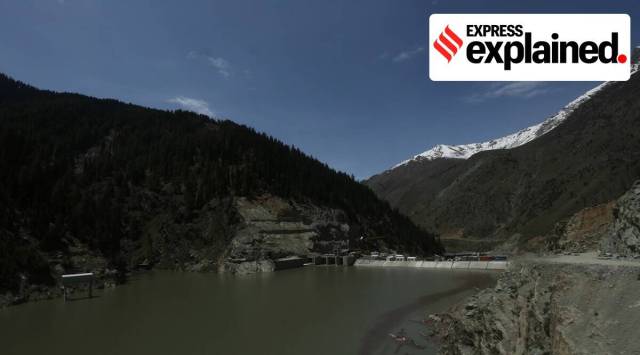Indus Waters Treaty: Demands for its renewal are not new, but what has changed now?
In a way, this is another Balakot moment. The Indus Waters Treaty notice is a message to Pakistan that India would be unpredictable in its dealings with it, and would not shy away from escalation.
 The Indus Waters Treaty is very prescriptive in what can or cannot be done on the rivers by India, the upper riparian state. (FILE)
The Indus Waters Treaty is very prescriptive in what can or cannot be done on the rivers by India, the upper riparian state. (FILE) There are two ways to look at India’s recent notice to Pakistan on the Indus Waters Treaty, which governs the sharing of six rivers flowing through the two countries.
It can be viewed as India’s countermeasure to Pakistan’s repeated objections to every irrigation or power project on the Indian side of the Indus basin. This would imply that if Pakistan drops its obstructionist approach, India might not insist on amending the Treaty.
Alternatively, this can be seen as the beginning of something more significant. India could be serious about making amendments to the Treaty and might have just set the ball rolling with the notice, served on January 25.
While it is too premature to hazard a guess on the eventual outcome of the move, the renegotiation of the Indus Waters Treaty is not as radical an idea as it appears. In fact, it is not a new idea at all.
Several reasons to renegotiate
Calls for amending or renegotiating the Indus Waters Treaty are being made for more than two decades now, on both sides. Despite being awarded nearly 80 per cent of the water flow in these rivers, Pakistan has always maintained that it has been treated unfairly, arguing that it should have been allotted some share of the Ravi, Sutlej and Beas rivers as well. The Treaty gave India full rights over the waters of these three ‘eastern’ rivers, while most of the flows in the three ‘western’ rivers, Jhelum, Chenab and Indus, were meant for Pakistan. The western rivers have far greater volumes flowing in them.
But this is not the only reason why Pakistani voices want the Treaty renegotiated. Experts on both sides agree that there have been significant changes since the Treaty came into being in 1960, and it needs to be updated. The impacts of climate change and the advancement in water storage and management technologies are cited as some of the most compelling reasons to renegotiate.
Climate change concerns bother Pakistan more. One of the consequences of climate change has been a decrease in the overall flows in the Indus river system. The decline thus far is just about 5 per cent from 1960, but is expected to worsen rapidly.
On the other hand, Pakistan’s population has increased by six to seven times since Independence, and is still growing at a fast pace. That means increased demand for water, and thus increased dependence on these rivers.
Accommodating new technologies
The Indus Waters Treaty is very prescriptive in what can or cannot be done on the rivers by India, the upper riparian state. But today’s dams or reservoirs are very different from the ones in the 1960s. Whenever India has tried to use newer designs and technologies, Pakistan has objected, like with the Baglihar dam.
The dispute over Baglihar dam had to be referred to a neutral expert who ruled in favour of India, arguing that the new technology, even if not fully in accordance with the Treaty, would prolong the life of the project and thus was in everyone’s interest. Making the Treaty non-prescriptive on design and technology could also help in mitigating the adverse impacts of climate change on water availability in the Indus river system.
Other reasons include the need for joint management, greater flexibility in utilisation of waters, and adoption of basin-wise approach in the management of the river waters. Some Pakistani voices also hope that a renegotiation of the Treaty would allow China to become a party, which would then neutralise India’s advantage. The Indus basin extends to China and Afghanistan as well.
Strategic move
These reasons notwithstanding, it would be naïve to assume that India’s proposal to modify the Treaty is driven by anything other than strategic interest. Despite its reputation as one of the most successful water-sharing agreements between countries, the Indus Waters Treaty has kept both India and Pakistan dissatisfied for six decades.
In his authoritative book ‘Indus Basin Uninterrupted: A History of Territory and Politics from Alexander to Nehru’, Uttam Kumar Sinha, a Senior Fellow at the Manohar Parrikar Institute of Defence Studies and Analyses, details the objections raised by several Parliamentarians, including Atal Bihari Vajpayee, when the Treaty was brought for ratification by Jawaharlal Nehru in 1960. Nehru was castigated for “yielding to Pakistan’s wishes” and agreeing to “concessions after concessions”.
However, the Treaty has been largely absent from public discourse after that, unlike in Pakistan, where its perceived injustice is part of everyday conversations.
However, the September 2016 Uri attack changed things in India, triggering a public clamour for weaponising the Treaty. Being the upper riparian state, India has a distinctive advantage, with the power to inflict damage entirely one-sided.
Indian governments until then had resisted the temptation to use the Treaty as a strategic tool against Pakistan. But in the aftermath of the attack, Prime Minister Narendra Modi’s ‘blood and water cannot flow together’ remark, and the temporary suspension of routine meetings of Indus Commissioners, signalled a departure. The recent notice to Pakistan is another step in the same direction.
In a way, this is another Balakot moment. The notice is a message to Pakistan that India would be unpredictable in its dealings with it, and would not shy away from escalation. Considering Pakistan’s desperate dependence on the Indus basin rivers, this in itself could be extremely unsettling.
- 01
- 02
- 03
- 04
- 05






































